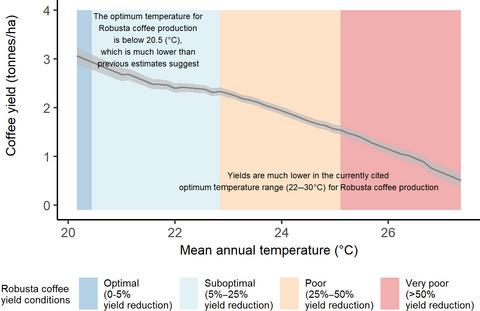当前位置:
X-MOL 学术
›
Glob. Change Biol.
›
论文详情
Our official English website, www.x-mol.net, welcomes your
feedback! (Note: you will need to create a separate account there.)
Not so robust: Robusta coffee production is highly sensitive to temperature.
Global Change Biology ( IF 10.8 ) Pub Date : 2020-04-17 , DOI: 10.1111/gcb.15097 Jarrod Kath 1 , Vivekananda M Byrareddy 1 , Alessandro Craparo 2, 3 , Thong Nguyen-Huy 1, 4 , Shahbaz Mushtaq 1 , Loc Cao 5 , Laurent Bossolasco 5
Global Change Biology ( IF 10.8 ) Pub Date : 2020-04-17 , DOI: 10.1111/gcb.15097 Jarrod Kath 1 , Vivekananda M Byrareddy 1 , Alessandro Craparo 2, 3 , Thong Nguyen-Huy 1, 4 , Shahbaz Mushtaq 1 , Loc Cao 5 , Laurent Bossolasco 5
Affiliation

|
Coffea canephora (robusta coffee) is the most heat-tolerant and 'robust' coffee species and therefore considered more resistant to climate change than other types of coffee production. However, the optimum production range of robusta has never been quantified, with current estimates of its optimal mean annual temperature range (22-30°C) based solely on the climatic conditions of its native range in the Congo basin, Central Africa. Using 10 years of yield observations from 798 farms across South East Asia coupled with high-resolution precipitation and temperature data, we used hierarchical Bayesian modeling to quantify robusta's optimal temperature range for production. Our climate-based models explained yield variation well across the study area with a cross-validated mean R2 = .51. We demonstrate that robusta has an optimal temperature below 20.5°C (or a mean minimum/maximum of ≤16.2/24.1°C), which is markedly lower, by 1.5-9°C than current estimates. In the middle of robusta's currently assumed optimal range (mean annual temperatures over 25.1°C), coffee yields are 50% lower compared to the optimal mean of ≤20.5°C found here. During the growing season, every 1°C increase in mean minimum/maximum temperatures above 16.2/24.1°C corresponded to yield declines of ~14% or 350-460 kg/ha (95% credible interval). Our results suggest that robusta coffee is far more sensitive to temperature than previously thought. Current assessments, based on robusta having an optimal temperature range over 22°C, are likely overestimating its suitable production range and its ability to contribute to coffee production as temperatures increase under climate change. Robusta supplies 40% of the world's coffee, but its production potential could decline considerably as temperatures increase under climate change, jeopardizing a multi-billion dollar coffee industry and the livelihoods of millions of farmers.
中文翻译:

不够健壮:罗布斯塔咖啡的生产对温度高度敏感。
Canopha canephora(罗布斯塔咖啡)是最耐热和“健壮”的咖啡品种,因此被认为比其他类型的咖啡对气候变化的抵抗力更强。但是,罗布斯塔的最佳生产范围尚未量化,目前仅根据其在中非刚果盆地原生范围的气候条件估算其最佳年平均温度范围(22-30°C)。利用东南亚地区798个农场10年的产量观察结果以及高分辨率的降水和温度数据,我们使用分层贝叶斯模型来量化罗布斯塔生产的最佳温度范围。我们基于气候的模型很好地解释了整个研究区域的产量变化,交叉验证的平均R2 = 0.51。我们证明罗布斯塔的最佳温度低于20.5°C(或平均最低/最高≤16.2/ 24.1°C),比当前估计值低1.5-9°C。在罗布斯塔目前假定的最佳范围中间(平均年温度超过25.1°C),与此处的≤20.5°C的最佳平均值相比,咖啡的产量降低了50%。在生长季节,平均最低/最高温度每升高1°C,即高于16.2 / 24.1°C,则单产下降约14%或350-460 kg / ha(95%可信区间)。我们的结果表明,罗布斯塔咖啡对温度的敏感性比以前认为的要高得多。当前的评估基于具有22°C以上最佳温度范围的罗布斯塔,可能会高估其合适的生产范围以及随着气候变化温度升高而对咖啡生产做出贡献的能力。罗布斯塔供应世界40%的咖啡,但随着气候变化导致温度升高,其生产潜力可能会大大下降,这将危及数十亿美元的咖啡产业和数百万农民的生计。
更新日期:2020-03-28
中文翻译:

不够健壮:罗布斯塔咖啡的生产对温度高度敏感。
Canopha canephora(罗布斯塔咖啡)是最耐热和“健壮”的咖啡品种,因此被认为比其他类型的咖啡对气候变化的抵抗力更强。但是,罗布斯塔的最佳生产范围尚未量化,目前仅根据其在中非刚果盆地原生范围的气候条件估算其最佳年平均温度范围(22-30°C)。利用东南亚地区798个农场10年的产量观察结果以及高分辨率的降水和温度数据,我们使用分层贝叶斯模型来量化罗布斯塔生产的最佳温度范围。我们基于气候的模型很好地解释了整个研究区域的产量变化,交叉验证的平均R2 = 0.51。我们证明罗布斯塔的最佳温度低于20.5°C(或平均最低/最高≤16.2/ 24.1°C),比当前估计值低1.5-9°C。在罗布斯塔目前假定的最佳范围中间(平均年温度超过25.1°C),与此处的≤20.5°C的最佳平均值相比,咖啡的产量降低了50%。在生长季节,平均最低/最高温度每升高1°C,即高于16.2 / 24.1°C,则单产下降约14%或350-460 kg / ha(95%可信区间)。我们的结果表明,罗布斯塔咖啡对温度的敏感性比以前认为的要高得多。当前的评估基于具有22°C以上最佳温度范围的罗布斯塔,可能会高估其合适的生产范围以及随着气候变化温度升高而对咖啡生产做出贡献的能力。罗布斯塔供应世界40%的咖啡,但随着气候变化导致温度升高,其生产潜力可能会大大下降,这将危及数十亿美元的咖啡产业和数百万农民的生计。











































 京公网安备 11010802027423号
京公网安备 11010802027423号